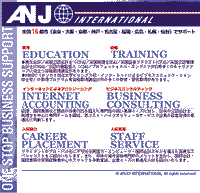Birthing Bean Counters in Japan
Back to Contents of Issue: April 2000
|
|
||
|
by Chieko Tashiro |
||
|
If it's possible
for there to be an exciting time to become a CPA, in Japan that
time is now. With the Internet economy taking off and various
financial and legal barricades being removed, there's a seemingly
insatiable appetite among corporations for Western-trained bean
counters.
What it all boils down to is the need for the Consolidated Financial Statement -- which investors rely on to show a corporation's exact financial management -- as opposed to Japan's traditional system of individual financial statements. The problem with the latter is that each company can write up its own in its own particular style, which leaves room for all sorts of imaginative manipulation. This contributed to Japan's bubble economy in the 1980s because no one had any way of knowing what companies were really worth. In February 1999, the Ministry of Finance set matters straight once and for all by declaring the consolidated financial statement the new standard. At least five schools are helping rush in the standard by guiding students toward US state licenses as CPAs, CFAs (chartered financial analysts), EAs (enrolled agents), CMAs (certified management accountants), and CIAs (certified internal auditors). Because the licenses are for particular states in the US, students -- who are generally in their twenties and thirties, though a few are in their sixties -- are required to fly to those states to take the actual exams. (Popular choices include Montana and Hawaii.) "The demand for CPAs is certainly increasing," says Masafumi Uema, president of Right Associates Japan Co., a human resources consulting company. He says, however, that obtaining a CPA is just the first step: In the past few years, he notes, many Japanese corporations have moved their operations overseas or merged with foreign corporations, so they need not just licensed CPAs but professionals who understand international taxation and consolidated accounts -- something only hands-on experience can provide. The schools offer placement services to help students get that experience. To encourage more students to sign up for the programs, the Ministry of Labor in October 1999 announced it would help qualifying students pay for their enrollment fees. To get the ¥350,000 in assistance, applicants need to have paid unemployment insurance for over five years. Schools approved by the ministry for this help include Anjo International, LEC, TAC, and the US Education Network. Business for the schools is booming. For example, 5-year-old
Anjo International has grown to 12 branches -- including one
in the US for expats -- and is planning to go public next year.
One can only hope the company will have its books in order. |
||
Note: The function "email this page" is currently not supported for this page.






